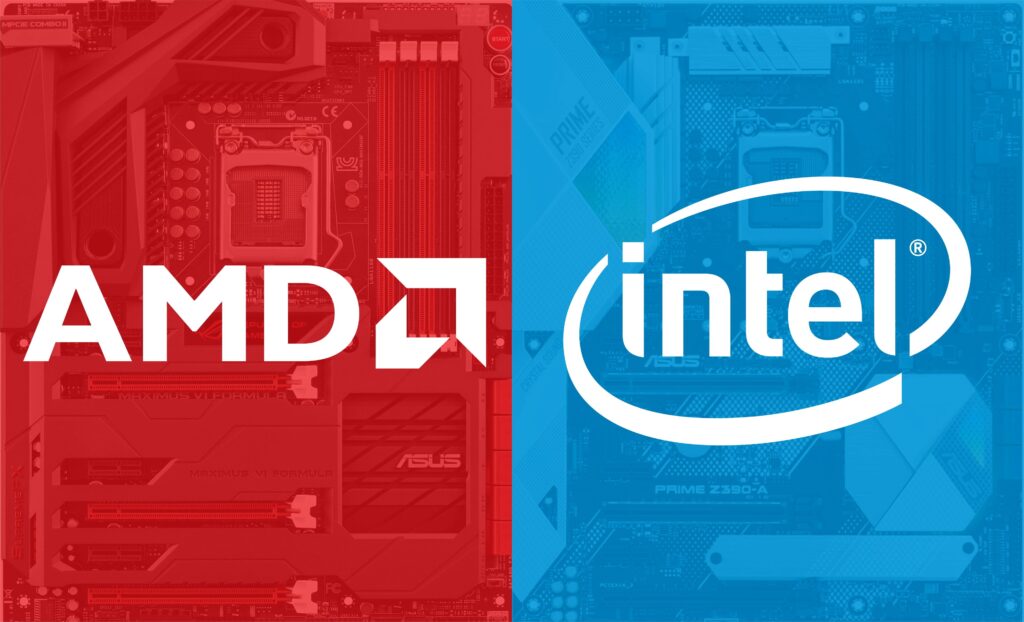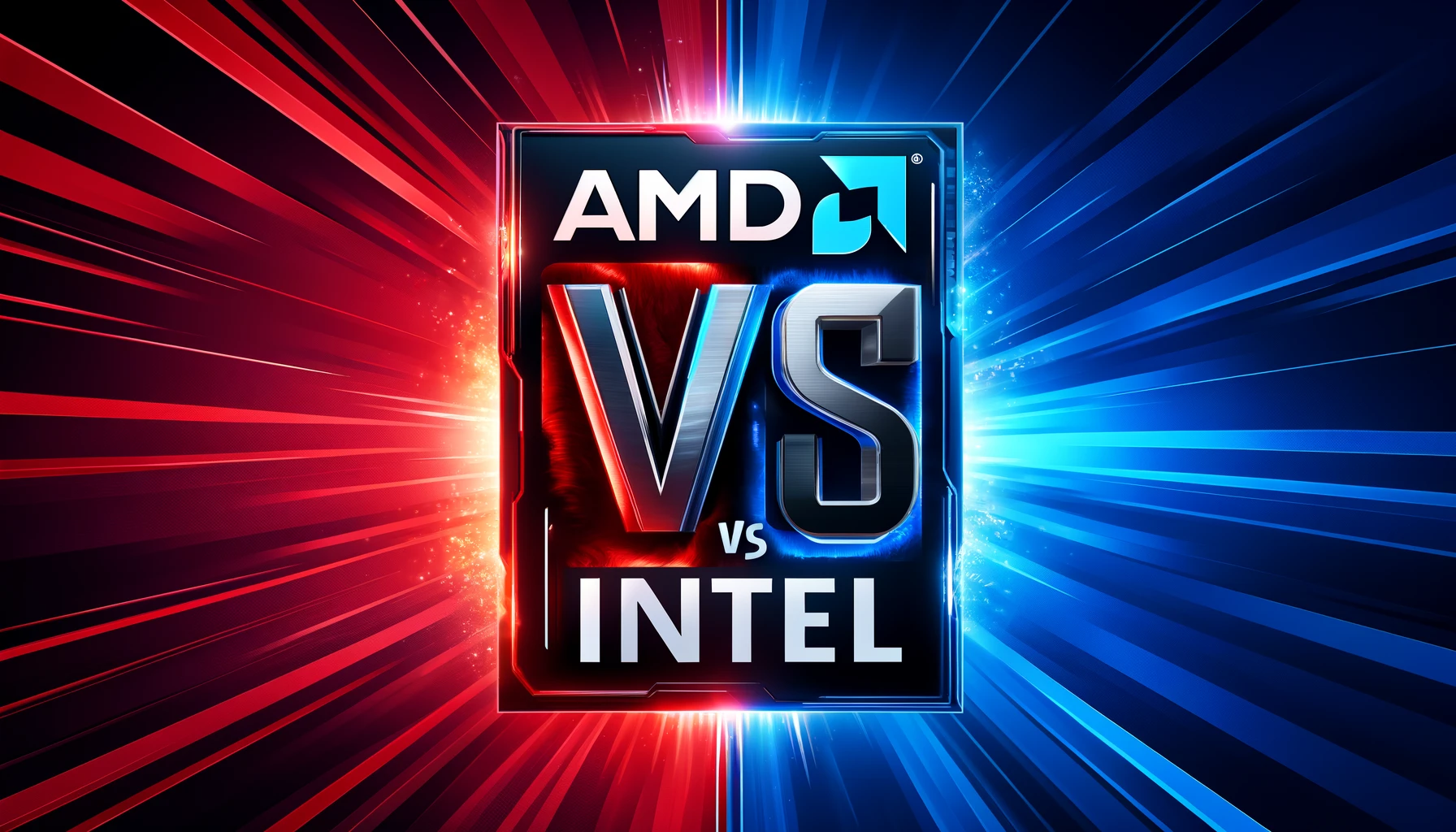AMD vs INTEL
The competition between AMD and Intel in the world of processors has been going on for a long time. Both brands have tried to attract customers with their respective technologies. Even in 2025, the debate continues regarding “AMD vs Intel, which is better?” That is, which processor will prove to be the best for your needs? In this article, we will discuss aspects like gaming, productivity, upgrade options, and integrated graphics in depth so that you can make the right decision.
1. Gaming Performance

The First Point in our AMD vs Intel battle is from a gaming perspective, Intel’s new 13th or 14th-generation processors, like the i7-13700K or i9-14900KS, are quite popular among gamers. Due to their high clock speed and multi-core support, they give very good performance in gaming, especially since these processors are well-optimized for Windows 11, which gives a smooth and lag-free experience.
On the other hand, AMD has taken the lead in the gaming market with its Ryen 7 7800X3D and Ryzen 9 7950X3D processors. These processors have 3D V-Cache technology, due to which the processor performs well even in heavy games. Although in single-core scores, it may be slightly behind Intel but you will not feel it even while gaming.
2. Productivity and Multi-threading

AMD vs Intel which one is better for productivity? If you need productive work other than gaming like video editing, 3D modeling, or machine learning, then both brands have the best options. Processors like the Intel core i9-14900K and i7-14700K are perfect for high-end tasks, especially when it comes to multi-core performance. These processors can easily handle heavy software like Adobe Premiere Pro, blender, After Effects, etc.
On the other hand, AMD Ryzen 9 9950X and Ryzen 7 7950X perform quite well in productivity. AMD processors have a higher amount of threads, which makes it easier to run multiple applications simultaneously. If your work is related to graphics then choosing AMD processors can be a profitable deal
3. Price-performance ratio

AMD vs Intel which gives you a more price-performance ratio? AMD sells its processors at a slightly cheaper price, while Intel’s processors are usually expensive. For example, AMD’s Ryzen 5 7600 or Ryzen 7 7700 is an affordable option for gaming. These processors support DDR5 RAM and will remain relevant for a few years to come.
On the other hand, processors like the Intel Core i5-14600K and Core i7-14700K are also available at an affordable price. One of Intel’s specialties is that it is compatible with both DDR4 and DDR5 RAM, giving the option to use older RAM, and reducing the overall system upgrade cost.
4. Platform and Upgrading Options

AMD’s new AM5 platform has been developed keeping the future in mind, in which you can upgrade your computer to new processors for a few years. This platform not only supports the current Ryzen 7000 and 8000 series but will also support new processors coming in the future, which makes AMD win this category in the AMD vs Intel battle.
On the other hand, Intel’s LGA1700 socket is in its last stage and it is going to be replaced by LGA1851 socket in the future. This means that people who are currently buying Intel systems may have to switch to motherboards with new sockets after a few years, which may increase the cost of the upgrade
5. Integrated graphics and gaming

If you want a system that can work even without a dedicated GPU, then AMD Ryzen 8000 series processors can prove to be better. These processors come with integrated graphics, which can run light games at 1080p resolution comfortably.
Intel’s i5 and i7 processors also have integrated graphics, but these are mainly better for basic tasks like web browsing or video streaming. If you need high-quality graphics, then the option with AMD’s integrated graphics may be more beneficial which again makes AMD win this category in the AMD vs Intel battle.
6. Thermal And Heating

AMD processors generally use less power and run cooler. Thermal management is better, especially in the Ryzen 7000 and 8000 series. On the other hand, Intel’s high-end processors like the i9-14900KS consume more power. During gaming or heavy tasks, Intel processors can generate more heat, which can increase cooling costs.
This also begs the question: “AMD vs Intel who is better?” If you want a system that consumes less power and runs cooler, AMD may be the better choice for you.
7. Which one to choose?

The question of “AMD vs Intel which is better?” offers different answers depending on the needs of each individual, and there are many factors to consider to make the right choice. Both brands are experts in their respective fields, but you will find the right option only if you understand your priorities and usage habits well.
Long-term upgrades and future planning
If you are planning to run your computer for a long time rather than upgrade it frequently, AMD’s AM5 platform may prove to be beneficial for you. This platform will remain compatible with new processors for many years to come. On the other hand, Intel often changes sockets for new generations of its processors, which also requires a change in the motherboard with every upgrade.
Priority of thermal and power management
Is your computer running for a long time and do you need power efficiency? AMD processors generate comparatively less heat and consume less power. On the other hand, Intel processors draw more energy during high performance and heat up faster, which may require additional cooling.
The right choice for your workflow
If your primary use is for gaming, video editing, or coding, the choice may vary. Intel processors may offer slightly better frame rates for gaming enthusiasts, but if you run multiple large software tasks at once such as rendering and coding the AMD processor’s feature of more cores and threads will make you more productive.
Budget-friendly option
If you’re looking for an affordable option, AMD offers more choices, especially in mid-range and entry-level processors. On the other hand, Intel processors also perform well in the mid-range, but AMD usually offers more value.
Support and software integration
Intel has better compatibility and driver support with some software, which can be a big advantage for professionals. AMD, on the other hand, is also working on constant software updates and driver improvements with its competitive performance, especially for gamers and content creators.
8. Verdict On AMD vs Intel
The Conclusion of our debate on AMD vs Intel is, If you are planning to upgrade in the future, AMD’s AM5 platform may be a better choice. On the other hand, those who want to excel in gaming can opt for Intel’s processors. Both companies are constantly improving their technology, giving consumers options for every requirement.
The question of “AMD vs Intel who is better?” now comes out with clarity. With the right information and based on your needs, you can choose the most suitable processor for you.
You can also visit websites like Tom’s Hardware, and SlashGear for more information. This article will help you decide, which one to choose.

Useful and well-structured. Looking forward to more posts from you.